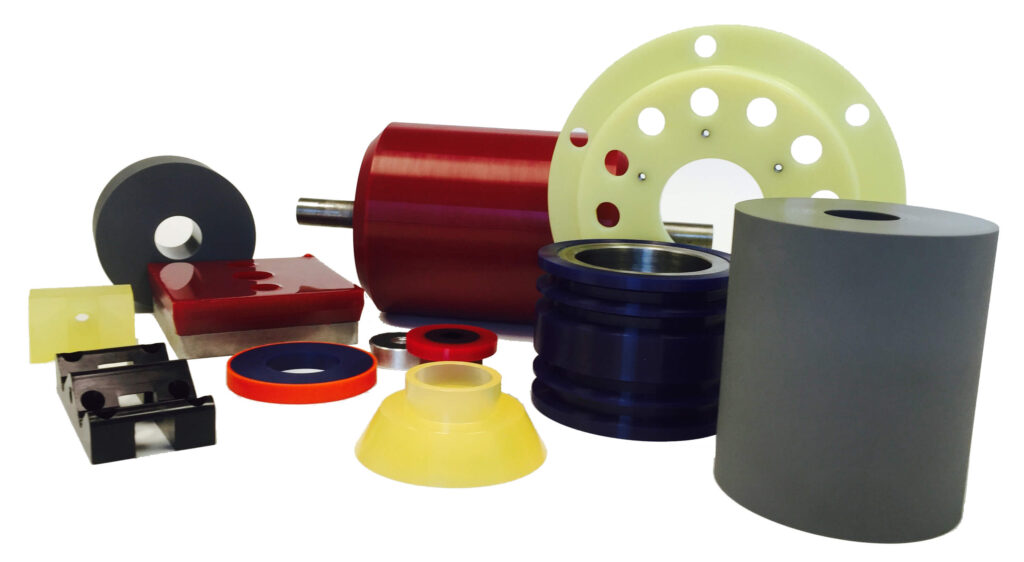When compared to rubber, metal, and plastic, urethanes versatility is undeniable, which makes it the preferred material for many industrial applications. See how urethane stacks up against its top competitors in the context of everyday industrial applications. Make sure you’re using the best material for your needs, your budget, and the safety of your employees!
How Does Urethane Compare To Rubber?
Rubber and urethane often go head-to-head when it’s time to replace parts in automated systems, industrial machines, and other applications. Each time, urethane is the clear winner, especially for bushings, spacers, and other high load-bearing applications.
Polyurethane/Urethane Outperforms Rubber On:
- Abrasion resistance
- Tensile strength
- Higher load-bearing capacity – Compressive strength
- Superior tolerance to grease, oil, oxygen and ozone
- Non-marring of products
- Water resistance in wet environments
- Low permanent set -a/k/a rebound
- Replaced less often, which decreases downtime and increases production
Take rubber gaskets, for example. To do their job well, a gasket needs to ensure a tight seal and be durable enough to hold up in a wide range of conditions. Rubber gaskets can degrade and rot over time, swelling and cracking faster than urethane gaskets. This means that an application relying on rubber gaskets will be compromised sooner than one using polyurethane gaskets.
How Does Urethane Compare To Metal?
Urethane has very distinct advantages over metal, especially in industrial applications. Springs are generally one application where customers might switch from steel or rubber springs to urethane springs, especially in suspensions, clutches, elevators, escalators, and shock absorbers.
Polyurethane/Urethane Outperforms Metal On:
- Sound dampening – It absorbs noise and vibration.
- Lighter in weight – Especially helpful in applications involving delicate machinery.
- Elastomeric – Can be compressed up to 25% of its normal size and still rebound.
- Cost Savings – Much more cost effective to mold and produce, especially in short runs.
- Abrasion and corrosive resistance – Out performs in a variety of applications, including abrasive, water and chemical environments.
- Marring – Will not leave marks on objects it comes into contact with.
Choose urethane over metal for your industrial application where electrical conductivity and magnetism must be considered. Urethanes molecular composition means that it doesn’t readily conduct electricity or corrode.
How Does Urethane Compare To Plastic?
With so many formulations of plastic available, it’s tough to do a one-to-one comparison of plastic and urethane. In general however, you can expect cast urethane to cost less to tool and depending on the formulation, a plastic sheet may not be able to offer the same flexibility and reliability.
Polyurethane/Urethane Outperforms Plastic On:
- Noise reduction
- Abrasion/impact resistance
- Ability to stretch and return to its original form
- Self healing
- Chemical resistance is greater
- Formulation and durometer range
Let’s look at how urethane stacks up to plastic in a common industrial application, like sheeting for cutting surfaces. While plastic sheeting can be made food-safe like urethane, it is not self-healing or as resistant to as many chemicals as urethane. Cast urethane sheeting can also be manufactured in a variety of thickness tolerances and durometers, to perfectly align with the needs of an application and work environment.

Polyurethane vs. Metal
Many industries prefer the versatility and durability of urethane over metal. Here are just some examples of the benefits of using urethane material over metal, starting with sound dampening.
![]()
Polyurethane vs. Rubber
The benefits of using standard urethane sheets versus rubber and its variations are significant. The ability to formulate different properties, are only the beginning.

Polyurethane vs. Plastic
If you purchase a material that does not hold up to various conditions, your downtime can cost man-hours and production loss. These issues could have been prevented by choosing a superior product.



